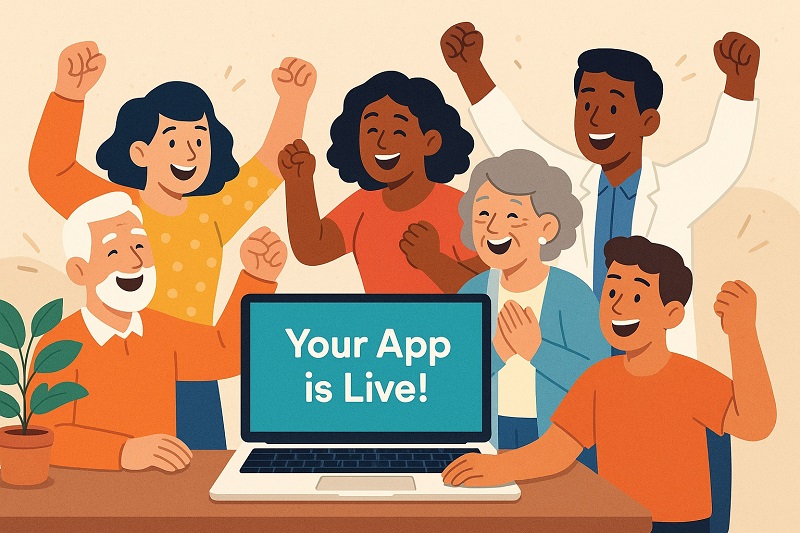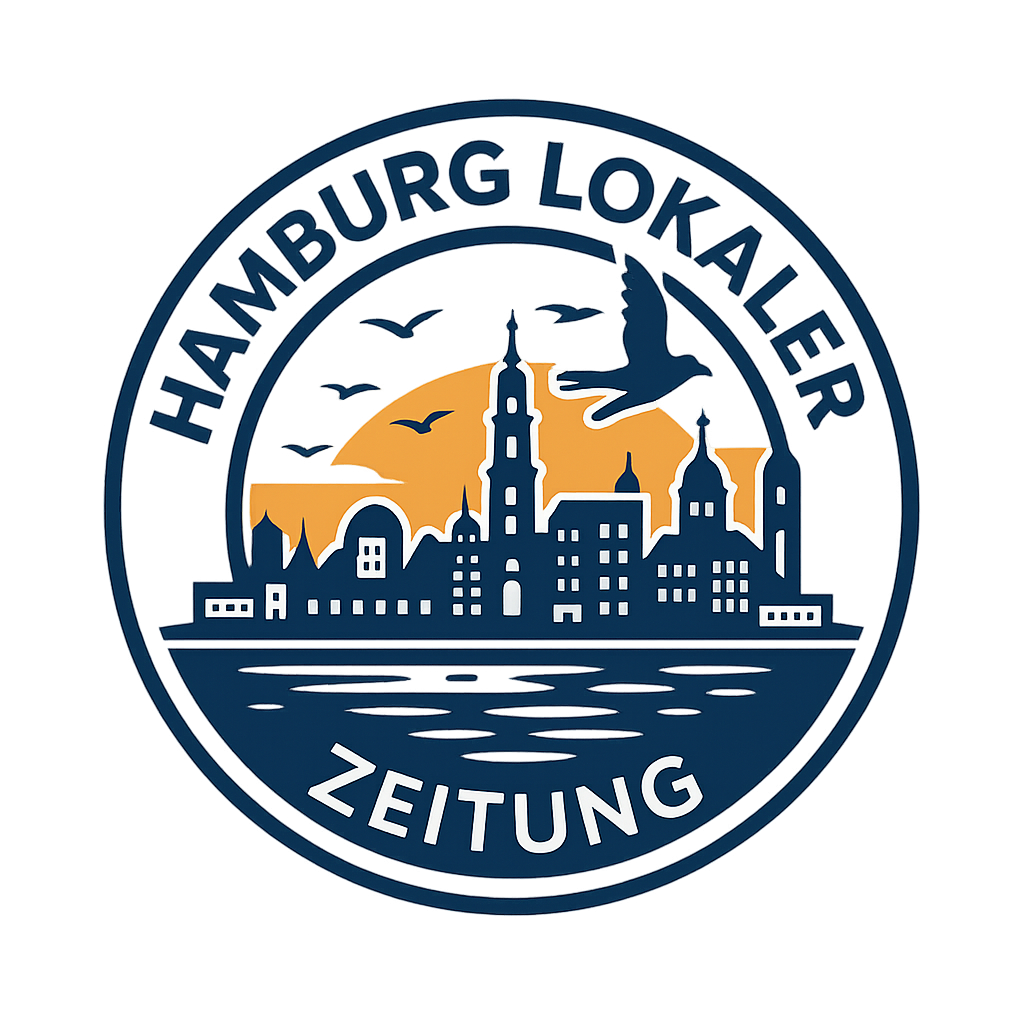Imagine being able to build a working software application without writing a single line of code. This is no longer a far-fetched dream. Thanks to advances in artificial intelligence, anyone can now create apps and websites simply by describing their ideas in everyday language. A new wave of AI-powered “no-code” tools is transforming who gets to be a creator. And Europe is at the forefront of this revolution – exemplified by a groundbreaking startup with an unlikely name: Lovable.
In tech circles, Lovable has quickly become synonymous with this AI Coding shift as Vibe Coding. In less than a year, this Swedish AI platform went from launch to unicorn status, all by helping people build software through a chat interface. But Lovable is just one part of a broader movement. From Berlin to London to Paris, a growing number of “citizen developers” – ordinary people with ideas but no coding background – are harnessing AI Coding to bring their visions to life. This article explores how AI-driven coding is changing software development in Western Europe, what Lovable’s meteoric rise means, and what we can all learn from it.

The New Wave of AI “No-Code” Platforms, as Vibe Coding
Technology is leveling the playing field of innovation. No-code and low-code platforms have been around for years, allowing users to drag and drop their way to simple apps or websites. However, the latest generation of tools is far more powerful – thanks to artificial intelligence. Instead of piecing together elements yourself, you can now describe what you want to build, and let AI generate the application for you. This emerging approach has been nicknamed “vibe coding” – essentially, coding by communicating your vision or “vibe” to an AI system.
At its core, vibe coding means you don’t need to understand programming syntax or frameworks. You just communicate in plain language. For example, you might say, “I need a budgeting app that tracks expenses and shows charts of spending by category,” and the AI platform will assemble the code, design the interface, and give you a working app. Generative AI models behind the scenes translate your instructions into software, handling everything from the user interface to database integration. It’s as if you have a virtual software engineer who never gets tired and can instantly try out your ideas.
This shift has enormous implications. It lowers the barrier to entry for software creation to virtually anyone who can use a computer. Have an idea for a helpful mobile app or a website? Now you can build a prototype in an afternoon. Early AI coding assistants like GitHub’s Copilot or Replit’s Ghostwriter were aimed at helping programmers write code faster. By contrast, the new AI creation platforms target people who aren’t programmers at all. They promise to turn natural language into working software, effectively making coding as easy as chatting. And while such AI tools are emerging globally, Europe is proving to be fertile ground for their growth, with one startup in particular capturing headlines.
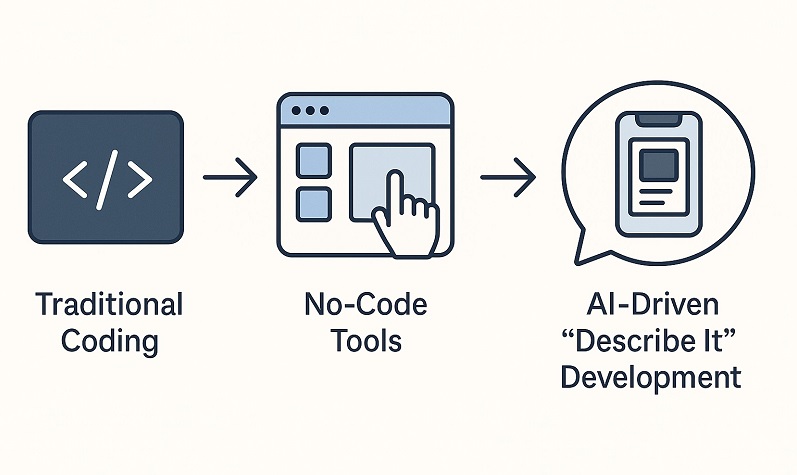
Lovable – Europe’s Homegrown AI Coding Unicorn
One of the brightest stars of this AI no-code movement is Lovable, a startup founded in Stockholm, Sweden. In a world where many high-profile tech innovations come out of Silicon Valley, Lovable’s rapid rise has put Europe on the map in a big way. The company launched its platform to the public in late 2024, and within just eight months it reached milestones that took other successful startups years. By mid-2025, Lovable had attracted over 2 million users, and tens of thousands of new projects were being created on it every single day. This explosive growth helped the company secure a record-breaking $200 million investment, vaulting it into “unicorn” status (a valuation over $1 billion) just months after launch. It’s now frequently cited as Europe’s fastest-growing software startup ever.
What makes Lovable special? In a nutshell, it allows anyone to build full-fledged apps and websites by chatting with an AI. The platform’s name embodies its mission: to enable “anyone to create software people love.” This human-centered branding is a deliberate departure from the usual tech jargon, and it seems to have struck a chord. Lovable’s origins actually trace back to an open-source project called GPT-Engineer, which appeared on GitHub in 2024 and wowed developers by automatically generating entire chunks of software from a prompt. Building on that concept, Lovable was born with a grander vision and a catchy name – and it quickly attracted a passionate community.
Under the hood, Lovable integrates a lot of complex technology (from code generation to cloud deployment), but it wraps all that complexity in a very user-friendly chat interface. A user can say, for example, “Build me a personal finance tracker with a login page and analytics dashboards,” and Lovable will generate the code, set up the database, and present the user with a working application. It even handles things like hosting the app online. This means someone with zero programming experience can go from idea to a live product in a matter of minutes or hours. That value proposition is incredibly powerful.
The startup’s co-founders, Anton Osika and Fabian Hedin, deliberately built Lovable to bring software creation to the 99% of people who have ideas but don’t know how to code. Unlike many AI developer tools that primarily target professional programmers or large engineering teams, Lovable focused on non-technical creators from day one. This strategic choice opened up a huge underserved market. In June 2025 alone, users of Lovable built over 2.5 million websites through the platform – accounting for more than 10% of all new websites created on the entire internet that month! The cumulative number of projects made with Lovable surpassed 10 million by that summer. These numbers are astonishing and illustrate how quickly a tool aimed at everyday creators can catch fire.
Lovable’s success has also been a proud moment for Europe’s tech scene. The company proved that you don’t have to be in California to build a world-leading tech product – you can do it from Scandinavia, or anywhere with talent and vision. It also showed a different way of growing a startup: Lovable shared its progress transparently on social media, openly posting revenue and usage stats. This cultivated a strong community following and trust. Early adopters were excited not just about what Lovable could do, but also about being part of its journey. In turn, that community buzz helped the platform grow even faster (a classic positive feedback loop for modern startups).
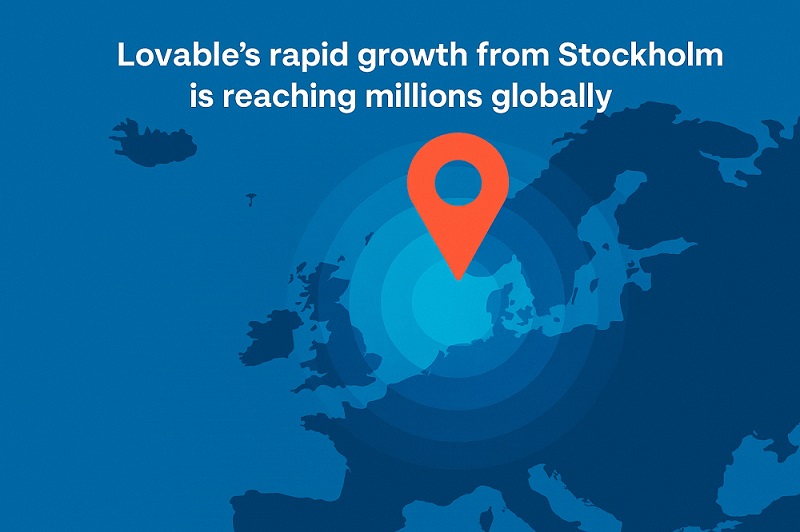
Empowering the 99% to Create Software through AI / Vibe Coding
The rise of tools like Lovable highlights a broader trend: the empowerment of the “citizen developer.” This term refers to people who create applications without formal coding training, often to solve problems in their own business or daily life. For years, business analysts and tech visionaries talked about a future where most software might be made by non-programmers. That future is now arriving. In fact, industry analysts predict that by the mid-2020s, a majority of new apps will be developed using low-code or no-code methods. The reason is simple – demand for software far outstrips the supply of professional developers, so businesses and individuals are looking for ways to build needed solutions themselves.
Europe, like the rest of the world, faces a shortage of software developers. Companies in Germany, the UK, France and beyond often struggle to hire enough IT talent to implement all their ideas. Meanwhile, employees in non-IT roles often have deep knowledge of the problems that need solving, but lack the technical skills to create solutions. AI-driven development platforms bridge that gap. They allow a marketing specialist, a school teacher, or an entrepreneur with no coding background to become a software maker. If you have an idea to streamline a process or serve your community, you no longer have to either beg the IT department for help or pay a fortune to an external developer – you can try to build it yourself with AI as your partner.
This democratization of software development can unleash creativity and productivity on a huge scale. Imagine a scenario in a small French retail business: the store manager wants a custom app to track deliveries and notify customers, but hiring a developer is too costly. With an AI tool, that manager could literally talk the app into existence – describing the features needed – and get a functional app to use in the store. Similarly, a university student in the UK with an idea for a social networking site can prototype it without needing to learn programming languages from scratch. The result is that more ideas get a chance to blossom, because the “idea people” can act on their ideas directly.
Lovable’s approach exemplifies this empowerment. Its interface is conversational and approachable, lowering intimidation for beginners. The platform also handles technical heavy lifting automatically (such as setting up databases, user authentication, and even deploying the app to the web). These are tasks that typically trip up non-technical folks, but Lovable hides those complexities behind the scenes. As a result, a first-time user can go from zero to a polished, usable application quickly. This kind of instant gratification in creation is incredibly motivating. It turns software development from a months-long endeavor involving teams of specialists into something more like a creative brainstorming session that yields an immediate tangible result.
Of course, professional developers are still crucial – they build the AI tools and will continue to handle complex or critical projects – but their role is evolving. In many organizations, developers are starting to act more as advisors or architects, guiding citizen developers and ensuring the apps built with these tools are secure and well-integrated. In turn, the citizen developers take care of the long tail of applications that IT never had time to get to. It’s a collaborative model where everyone focuses on what they do best: the AI handles the repetitive coding, the professional developers handle the tough engineering and oversight, and the domain experts (citizen devs) craft solutions that fit their immediate needs.
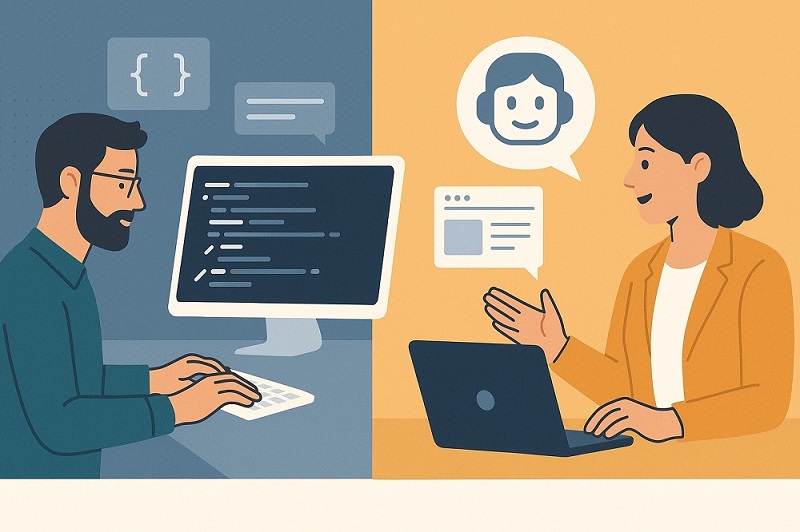
Western Europe’s Embrace of AI Development
This new paradigm of AI-assisted development is being eagerly embraced across Western Europe. Each country in the region brings its own flavor to the trend:
- Germany: Known for its strong engineering and Mittelstand (small-to-medium businesses), Germany sees AI no-code tools as a way to accelerate digital transformation. Many German companies, from startups in Berlin to manufacturers in Bavaria, are experimenting with platforms like Lovable to quickly prototype internal tools. The ability to create custom software in-house without large developer teams is especially attractive to midsize businesses looking to stay competitive. Germany’s tech investment landscape is also on the upswing – in recent years, German startups even briefly surpassed UK startups in total VC investment. This indicates a robust appetite for innovation, which extends to exploring cutting-edge solutions like AI coding assistants.
- United Kingdom: The UK’s tech scene, centered around London’s fintech and startup ecosystem, has always been quick to adopt new technologies. British startups and even corporate innovation labs are testing AI-driven development as a way to reduce time-to-market for new products. In the financial sector, for instance, where London excels, there’s interest in using AI tools to rapidly build and iterate software prototypes while ensuring compliance and security. The UK’s abundance of tech meetups and hackathons has also started to include “build an app with AI” workshops, reflecting how mainstream the idea is becoming among British tech enthusiasts. Moreover, with a keen focus on efficiency due to economic pressures, UK businesses appreciate the cost savings that can come from automating coding tasks.
- France: France has cultivated a strong AI and startup community, supported by initiatives like “La French Tech.” French companies and developers are likewise embracing AI development tools. A notable example is PhotoRoom, a Paris-based AI photo editing startup that became an early adopter of Lovable to help build some of its web tools. This kind of usage underscores that even tech-savvy startups see value in speeding up development by offloading work to an AI. Additionally, France’s emphasis on open-source technology and collaboration (epitomized by companies like Hugging Face in the AI space) means developers are inclined to experiment with new AI platforms and even contribute to their improvement. French tech events now frequently discuss topics like generative AI in coding, indicating high interest.
Across Western Europe, a common thread is emerging: AI coding tools are not viewed as threats, but as enhancers. Businesses see them as a chance to innovate faster, and individuals see them as a chance to finally act on ideas without needing extensive training. Governments and educational institutions are also paying attention. In Germany and France, for instance, there are discussions about integrating more digital skills and AI tool training into curricula, so the next generation can fully leverage these platforms. And while the EU is working on regulations to ensure AI is used ethically and safely, European policymakers also recognize that fostering home-grown AI innovation (like Lovable) is key to the region’s competitiveness.
It’s also worth noting that Europe’s startup ecosystem has gained confidence from Lovable’s success. The fact that investors around the world poured money into a Swedish AI venture demonstrates a belief that world-class tech products can emerge from Europe’s cities. This confidence can create a ripple effect – inspiring more entrepreneurs in places like Munich, Edinburgh, or Amsterdam to pursue bold ideas in AI and software, knowing that location is not a barrier. In an era when remote collaboration is easy and AI models are accessible via the cloud, a small team in Europe can absolutely build technology that serves the entire globe.

Key Lessons and Takeaways
The advent of AI-driven software creation offers several important insights and lessons for businesses, creators, and tech enthusiasts alike:
- Lowering Barriers Unlocks Innovation: When more people can participate in building solutions, we get more innovation. By removing the need to code, tools like Lovable empower a much wider talent pool to solve problems. Great ideas no longer die on the vine due to lack of programming skills. The lesson: if you provide user-friendly tools, creative people will surprise you with what they make.
- User Experience Matters, Even for Developers: One reason Lovable took off is that it made the app-building experience conversational, quick, and even fun. Focusing on a “lovable” user experience – not just raw functionality – helped it stand out. For any product (tech or otherwise), crafting a pleasant, intuitive experience can be a game-changer. People flock to tools that are enjoyable and easy to use.
- Community and Transparency Fuel Growth: Lovable built a strong community by sharing its journey openly (such as posting usage stats and acknowledging issues publicly). This transparency created trust and enthusiasm among users. The broader point: engaging your user community and being honest about your progress or setbacks can turn users into evangelists who drive your growth. In the age of social media, building in public can be a powerful strategy.
- Solve Real Pain Points Thoroughly: The most successful tools zero in on real user problems. For example, Lovable identified that setting up the backend (servers, databases) was a stumbling block for novices, so it integrated a one-click solution for that. By deeply solving a key pain point (not just superficially addressing it), the platform removed a major obstacle for its users. Focusing on a specific need and doing it really well can beat a more generic approach that tries to do everything at once.
- Embrace the Citizen Developer: Companies and teams should recognize the value of non-traditional developers in their ranks. If an employee from marketing or operations can create an app that improves a workflow, that’s a win for the organization. Encouraging and training these citizen developers can lead to faster solutions and take pressure off overloaded IT departments. Instead of viewing unsanctioned apps as a nuisance, smart leaders are finding ways to support and channel this grassroots innovation (with appropriate governance in place).
- Prepare for New Challenges: Every technological shift comes with its own challenges. With AI-generated software, concerns have been raised about security, quality, and maintenance. It’s important to establish best practices for reviewing and refining AI-produced code. Lovable’s team, for instance, had to quickly address a security incident early on by improving how their AI checks for vulnerabilities. The takeaway: whether you’re providing an AI tool or using one, be mindful of issues like data privacy, security holes, or errors. Putting proper oversight and review processes in place is key as we integrate AI more deeply into development.
The Future of AI-Driven Development
The story of Lovable and the rise of AI coding platforms hints at a future where having an idea is all you need to create new software. We are witnessing the beginning of an era where the traditional barriers between imagination and implementation are dissolving. In this future, a brilliant concept from a solo entrepreneur in a small town can be turned into a real application overnight, with minimal resources – something that used to require a whole team of engineers and lots of funding. This democratization could lead to an explosion of creativity and problem-solving, as millions more people contribute software solutions to the world.
For Europe, the implications are especially heartening. The success of a company like Lovable redraws the map of tech innovation. It proves that world-leading tech products can be built outside the usual hotspots. As AI reduces the importance of physical location (since collaboration and deployment happen online), we can expect to see more success stories coming from diverse places – from Western Europe’s well-established tech hubs to smaller cities and regions that traditionally haven’t had a big tech presence. The playing field in the startup world is leveling, much like the playing field for who can build software is leveling. This could help Europe retain talent (fewer founders feeling they must move to Silicon Valley) and foster home-grown solutions tailored to European needs and values.
What about professional software developers? Rather than rendering them obsolete, AI development tools are likely to redefine their roles. Just as the advent of high-level programming languages or automation frameworks changed what developers focus on (shifting them away from repetitive grunt work to more complex design and architecture), AI will do the same. Future developers might spend less time writing boilerplate code and more time ensuring that AI outputs align with user needs, are secure, and follow ethical guidelines. In fact, new roles may emerge – for example, “AI software mentor” or “prompt engineer” – where a person’s job is to craft effective queries for AI coders and refine their output. The nature of coding is expanding to include guiding AI, not just manually typing lines of code.
Ultimately, the goal of tools like Lovable is not to remove humans from the loop, but to amplify human potential. They automate the tedious aspects of coding, allowing creators to focus on ideas, design, and solving problems. The future of development will likely be a collaborative dance between human creativity and AI capability. In this vision, software development becomes more about what you want to build and why, rather than exactly how to write the code for it – the AI will take care of a lot of the “how.”
For readers in Germany, the UK, France, and across Europe, there’s never been a more exciting time to dream up digital solutions. Whether you’re an entrepreneur, a student, or a professional in any field, the barrier to turning your ideas into reality is lower than ever. The tools are increasingly at your disposal to prototype a new app or automate a task by yourself. As these AI platforms continue to mature, expect them to become even more accessible, with support for multiple languages and integration of more complex features. We may even see government and community-backed AI tools to help small businesses and public sector workers create solutions tailored to local needs.
In conclusion, the AI coding revolution is here – and it’s an open invitation to creators of all stripes. Europe’s experience with Lovable shows that this revolution isn’t confined to one region; it’s a global phenomenon that Europe is actively shaping. The distance from idea to implementation has shrunk dramatically. So if you have a software idea that you’ve been holding back on because you lack programming skills, now is the time to revisit it. You might find that an AI is ready to help you build something not just viable, but truly lovable.
